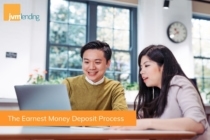As you embark on the journey of home buying, you may encounter the term “earnest money deposit” or EMD. What is its significance? In real estate transactions, an earnest money deposit is a specific amount of money you pay to demonstrate your serious intent to buy a particular property. Consider it a monetary gesture that solidifies the mutual intent between you and the seller to proceed with the transaction.
How Does an Earnest Money Deposit (EMD) Work?
Once you’ve found the home of your dreams, you’ll make an offer. If the seller accepts your offer, you’ll typically have to provide an earnest money deposit to secure the deal. This deposit is usually held in an escrow account by a third party, like a title company, until the closing. The EMD is then applied toward your payment and closing costs.
The earnest money serves as a sign of good faith. It shows the seller that you’re committed to the purchase and not just window shopping. If you back out of the deal for reasons not stipulated in the purchase contract, you could lose your EMD. On the flip side, if the seller backs out, you’ll get your earnest money back.
How Much Is an Earnest Money Deposit?
Determining the amount for an earnest money deposit (EMD) is a crucial step in the home-buying process. So, how much should you expect to pay? Generally, the amount ranges between 1% and 5% of the home’s purchase price. However, this can vary based on several factors, including the competitiveness of the local real estate market, the seller’s expectations, and the terms of the purchase contract.
For example, in a seller’s market where demand for homes is high, you might choose to offer a larger EMD to make your offer more appealing. Conversely, in a buyer’s market, where there’s less competition, a smaller EMD might suffice.
Always consult with your real estate agent to gauge what a reasonable earnest money deposit would be for your specific situation. Your agent can provide insights into local market conditions and help you decide on an amount that not only secures the property but also aligns with your budget.
Remember, the earnest money is usually applied toward your payment and closing costs at the time of closing. So, while it’s an upfront cost, it’s not an additional cost over and above the price of the home.
In summary, the amount you’ll pay for an earnest money deposit can vary widely, but understanding the factors that influence this amount can help you make an informed decision.
Earnest Money vs Down Payment: What’s the Difference?
While both the earnest money and down payment are financial commitments, they serve different purposes. The down payment is a percentage of the home’s purchase price that you pay upfront, usually at closing. The EMD, however, is a smaller amount that you pay when the seller accepts your offer to secure the deal.
Unlike the down payment, the earnest money deposit is at risk if you back out of the contract without a valid reason.
Good Faith Deposit vs Earnest Money: Are They the Same?
You might hear the terms “good faith deposit” and “earnest money” used interchangeably, but are they the same? Essentially, yes. Both are sums of money given to show your commitment to buying a home. However, “earnest money” is more commonly used in real estate, while “good faith deposit” might be used in other types of transactions.
What Happens If the Buyer Does Not Deposit An EMD?
So, what’s the worst that could happen if you don’t deposit your earnest money? Well, without an EMD, the seller has no assurance of your commitment. This could lead to the seller accepting another offer, and you losing out on the home you wanted. In short, no earnest deposit money means less security in the transaction for both parties.
View mortgage rates for
April 28, 2024
How Much Should You Put Down as an Earnest Money Deposit?
The amount varies, but it’s generally between 1% and 5% of the home’s purchase price. The exact amount can depend on various factors, including the local real estate market and the seller’s preferences. Always consult with your real estate agent to determine an appropriate amount for your situation.
Is the Earnest Money Deposit Refundable?
One of the most common questions homebuyers have is, “Is the earnest money deposit refundable?” The short answer is: it depends on the conditions outlined in your purchase contract. Generally, your earnest money deposit is refundable under certain circumstances, making it different from a non-refundable deposit.
For instance, most purchase contracts include contingencies that allow you to back out of the deal without losing your EMD. These contingencies might include:
- Home Inspection Contingency: If a home inspection reveals significant issues that the seller is unwilling to fix, you can usually walk away from the deal and get your earnest money back.
- Financing Contingency: If you’re unable to secure a mortgage within a specified timeframe, this contingency allows you to get your EMD back.
- Appraisal Contingency: If the home’s appraisal comes in lower than the purchase price and you can’t make up the difference, you can generally back out and reclaim your earnest money.
- Title Issues: If there are problems with the home’s title that can’t be resolved, you’re typically entitled to get your EMD back.
However, if you decide to back out of the deal for reasons not covered by these contingencies, you risk losing your earnest money deposit. Always read your purchase contract carefully and consult with your real estate agent or a legal advisor to understand the conditions under which your EMD is refundable.
So, while the earnest money serves as a sign of your commitment, it’s not always set in stone that you’ll lose it if things don’t work out. Understanding the terms and conditions can save you from unpleasant surprises and make your home-buying experience a more enjoyable one.
Frequently Asked Questions
Is the earnest money deposit refundable?
Generally, yes, if you follow the terms outlined in the purchase contract. For example, if the home inspection reveals significant issues, you can usually back out and get your EMD back.
Who holds the earnest money?
Typically, a neutral third party like a title company will hold the EMD in an escrow account.
Can I lose my earnest money?
Yes, if you back out of the deal for reasons not covered in the purchase contract, you risk losing your EMD.
Is the EMD applied to closing costs?
Yes, the earnest money deposit is usually applied to your payment and closing costs at the time of closing.
Your Next Steps
Ready to take the next step in your home-buying journey but still have questions about earnest money deposits, down payments, or closing costs? Don’t navigate these crucial financial decisions alone. Reach out to the mortgage experts at JVM Lending for personalized, professional guidance. We’re here to demystify the process and provide you with the information you need to make confident, informed choices.
Contact JVM Lending today at (855) 855-4491 or [email protected] to ensure your path to homeownership is as smooth and stress-free as possible. Your dream home awaits, and we’re excited to help you get there!











